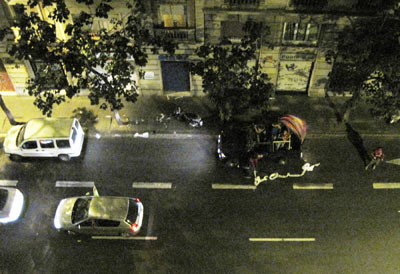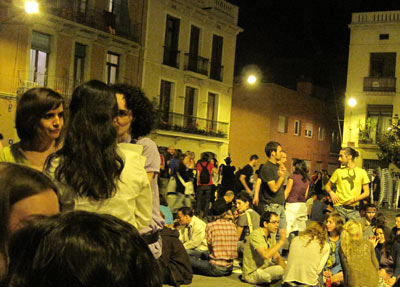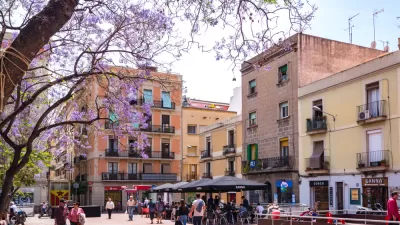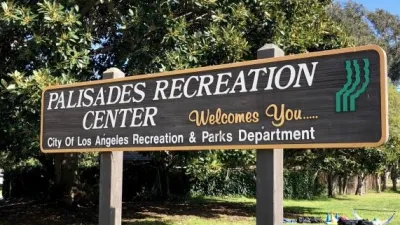Here in Los Angeles, the local professional basketball team just won its league's national championship. When I was in Barcelona a few weeks back, the local soccer team won a major international championship. These were two days for the cities to celebrate their home teams' triumphs, but the differences in how they celebrated says a lot about these cities and their civic cultures.
Here in Los Angeles, the local professional basketball team just won its league's national championship. When I was in Barcelona a few weeks back, the local soccer team won a major international championship. These were two days for the cities to celebrate their home teams' triumphs, but the differences in how they celebrated says a lot about these cities and their civic cultures.
I had just arrived in Barcelona as the European Champions League final between FC Barcelona and Manchester United was getting underway. I made it from the airport to my cousin's apartment in Barcelona by half-time, and the local team was already up 1-0. The streets were pretty much deserted, as all eyes were on the game. Excited yelling could be heard from the windows when a good play was made or when a shot nearly missed. The game was everywhere. And when Barcelona scored a second goal, it was unavoidable. Fireworks were shot off from rooftops and intersections. Cheers could be heard from all directions. Grown men stood at their balconies screaming as loud as they could at nobody in particular, and at everybody.
When the game ended, the streets exploded. Car and scooter horns were constantly beeping. People were yelling. Fireworks boomed in the background and nearby. Newspapers and napkins were thrown from windows down onto the streets. A car full of at least 10 cheering fans stopped near my cousin's apartment to honk, yell and dance in the road, singing the song of the champions: "Campeones! Campeones! Ole, ole, ole!"

And here, in a nearby plaza (one of many in the city), hundreds of people gathered to drink and sing and be together.

I like soccer, so I was excited. But even for those who don't particularly care, it was pretty much impossible not to be swept up by the emotion. And it was ubiquitous throughout the city. We went out drinking in the streets, as did countless others in countless plazas throughout the city, until the early hours of the morning. Thousands gathered in the city's main plaza, Plaza Catalunya, as can be seen in the video below:
For the most part, it was good, clean, drunk fun. People were celebrating, singing, and generally being happy that their hometown boys took the cup. A few cars got rocked, some obligatory police riot geared was dusted off, but nothing terrible happened. Just people. Drunk. And singing. Event-based urbanism at its finest.
Back here in L.A., the scene was totally different. When the game ended and the L.A. Lakers became the champions, practically nothing happened. I stuck my head outside as I'd done in Barcelona a few weeks back to hear the joyous response. But it never quite came. A handful of car horns and a small group of people yelling at a nearby intersection were about all that could be heard from my house, and I'm in a pretty dense part of the center city. Overall, it seemed like nobody cared. Or at least nobody cared enough to scream out of their window and get drunk in the streets.
However, to the city's credit, there was a pretty sizable crowd gathered outside the Lakers' stadium, which can be seen in the video below. A couple hundred fans yelled and screamed for about an hour before the LAPD politely ushered everyone (including those trying to jump on cop cars) off the premises. In comparison to the full-on street party put on by their counterparts in Barcelona, Lakers fans held a noontime luncheon at the old folks home.
And then they tried to start a fire.
This post from an L.A. Times blog details some of the crowd silliness, which includes various small bonfires, vandalism of an MTA bus, and a crowd of fans surrounding LAPD Chief William Bratton chanting "Chief of police! Chief of police!" Seriously. 25 arrests were made that night
Here's a view of the area near the stadium, where most of the celebration was concentrated. In stereotypical L.A. fashion, the street celebration takes place in cars, jammed on a slow moving street.
But there was a little more action in L.A., just not when you would have expected it. The most activity related to the Lakers' championship actually happened before they even won. Three days before the team secured the title, they won their third game of the best-of-seven series. This got people excited out in east L.A., where crowds filled one street, rocking cars trying to get by and generally making a ruckus for a few hours. The cops came, swept the streets and everything went back to its normal state.
This report from KCAL TV shows a good overhead shot of the crowds near the stadium after the team won, and the street in East L.A. where crowds caused some trouble a few days before.
Whittier Boulevard is a notorious drag for public activity, and the cops were ready in case any shenanigans were to go down when the team won the series.
So, you can see that some celebrations did happen in L.A., but they were isolated and heavily-policed -- largely a reaction to some burned cop cars and other out-of-hand celebrations when the Lakers won the championship in 2000. But the sharp contrast between L.A.'s celebrations and those in Barcelona says a couple important things about L.A.: the city's form is not conducive to public gathering; the majority of the city's people don't care enough about anything to yell out of their windows; and even the most likely unifying event that could bring people together couldn't wrangle up more than a couple hundred people and some car horns.
Greater density in L.A. might have made the celebrations more intense, like they were in Barcelona, but I think the ubiquitousness of Barcelona's celebrations has more to do with the city's provision of public spaces.
Overall, the celebrations in L.A. were largely an excuse for some less-than-civic-minded folks to try to destroy public property. Then they got in their cars, honked for a while and went home. They could learn a lot from Barcelona fans about how to celebrate. They should also use their pale attempt at celebrating to realize that their city doesn't give them enough physical opportunity to be together, even when they're champions.

Alabama: Trump Terminates Settlements for Black Communities Harmed By Raw Sewage
Trump deemed the landmark civil rights agreement “illegal DEI and environmental justice policy.”

Planetizen Federal Action Tracker
A weekly monitor of how Trump’s orders and actions are impacting planners and planning in America.

The 120 Year Old Tiny Home Villages That Sheltered San Francisco’s Earthquake Refugees
More than a century ago, San Francisco mobilized to house thousands of residents displaced by the 1906 earthquake. Could their strategy offer a model for the present?

In Both Crashes and Crime, Public Transportation is Far Safer than Driving
Contrary to popular assumptions, public transportation has far lower crash and crime rates than automobile travel. For safer communities, improve and encourage transit travel.

Report: Zoning Reforms Should Complement Nashville’s Ambitious Transit Plan
Without reform, restrictive zoning codes will limit the impact of the city’s planned transit expansion and could exclude some of the residents who depend on transit the most.

Judge Orders Release of Frozen IRA, IIJA Funding
The decision is a victory for environmental groups who charged that freezing funds for critical infrastructure and disaster response programs caused “real and irreparable harm” to communities.
Urban Design for Planners 1: Software Tools
This six-course series explores essential urban design concepts using open source software and equips planners with the tools they need to participate fully in the urban design process.
Planning for Universal Design
Learn the tools for implementing Universal Design in planning regulations.
Clanton & Associates, Inc.
Jessamine County Fiscal Court
Institute for Housing and Urban Development Studies (IHS)
City of Grandview
Harvard GSD Executive Education
Toledo-Lucas County Plan Commissions
Salt Lake City
NYU Wagner Graduate School of Public Service





























